Another review from Nicole O'Driscoll for a book published in 2010.
- A bloody great volume of poetry
- A bloody great volume of poetry
If it seems that summer weather gets more
capricious every year, Robin Robertson’s The
Wrecking Light connects the reader with sweep of nature that pulses between
far more tempestuous extremes. Between these extremes swing the petty
complexities of human existence with its equally capricious behaviours. You can
take a human out of the landscape, but you can’t take the landscape out of the
human; this seems to be the driving force behind Robertson’s relentless
interrogation of himself, his memories, his deceptions, and his relationship to
the ancients.
The
Wrecking Light is structured into three parts:
‘Silvered Water’, ‘Broken Water’ and ‘Unspoken Water’. The glossary explains
‘Silvered Water’ as ‘placing a silver coin in a bowl of water … preparation for
a wish.’ ‘Unspoken Water’ is a healing ritual that involves collecting moving
water from under a bridge (over which the dead cannot pass, they can only be
carried), carried in a vessel that must not touch the ground, and silvered
before being sprinkled over the afflicted person. It is a traditional Scottish
ritual against sickness and the Evil Eye. ‘Broken Water’ is not explained in
the glossary, but its obvious connotation is with broken birth waters and the
onset of labour.
Surprisingly then, the grouping of poems in
‘Broken Water’ is the most austere, gathering themes of ancestry, religion,
war, and morality. Robertson dedicates poems to Ovid, Neruda and Baudelaire,
the effect of which reinforces the timelessness and primitivism of the
destruction waged on human life by life itself, and by other humans. Robertson
effortlessly recreates the textures of nature, daydreaming an alternative
‘place of peace and honour, fresh running water,/ a morning of porcelain and
lavender/ combed by light, folded and smoothed over.’ The softness of these
subtle end-rhymes is deceptive though, for outside of the poet’s imagination
all that nature offers is ‘a closed silence.’ Robertson comes on the scene of a
family, dead, at a prehistoric camp, the parents sitting next to each other.
His use of language is characteristically intense throughout; he reaches in to
this scene and lays their dead child ‘down/ into the wing of a swan’ with the
tender touch of the last person on the scene to close the eyes of the deceased.
‘Silvered Water’ moves between
contemplating death in different forms and appearances, and contemplating the
responsibility of fatherhood as being so intense that his hands are ‘full of
deceit’ when he slips them out of his sleeping daughters’ to creep back downstairs
after telling them stories. The soul and history of the landscape is stitched
into his daily life and again, the natural rhythm of place and the character of
place pulsates between domesticity and eeriness. In ‘Album’ he juxtaposes the
child who is never still for family photographs with the ghost who is always
there but rarely seen.
‘The Plague Year’ is a dystopian ballad of
mass destruction that neither people nor animals can survive. The last stanza moves
from uninterrupted images of nature to a catalogue of gout-inducing luxury
foods – canapés of smoked fish and caviar for the powers that be. Robertson
imagines himself tasting the food and finding it tainted with imagery of
torture: ‘I saw the electrodes/ in a bucket, the blade, the gaff, the captive
bolt,/ walking my plate around the stations of the dead.’ The reader is left
unsure as to whether the poet is invoked here by the shades of the dead to
advocate for them, or if his full plate is paraded by the bolted captive as an
indictment of his complicity with the worst of human nature. Either way,
Robertson states clearly from the opening stanza that he wants no part of
either: ‘What is there left/ to trust but this green world and its god, always
returning to life?’
He answers his own question in ‘The Wood of
Lost Things’, the opening poem of the ‘Unspoken Water’ section and the
climactic poem of the collection. Memories are overgrown and intertwined with
nature; the child finds out the secrets of adulthood, ‘the place I wasn’t meant
to find.’ With that comes a sense of existential isolation, with his family
‘walking away into the blue distance,’ turning their heads to look back.’ The
supernatural backdrop of human existence culminates in this poem where
Robertson continues his conversations with the dead who ‘unbury themselves’ to
witness him recognise himself in the face of another seated corpse that he
comes across. They shiver and small-talk, wondering where they are: ‘This is my home, we replied.’
It is impossible to capture the scope of The Wrecking Light with its epic span
across geographical and literary history, and the endless wanderings of a
restless human spirit whose imagination has been lumbered with every restless
form of life. The elements are not generous – ice and snow feature often,
creating an uninviting atmosphere that is our ultimate homestead. Robertson’s
ghostly collision of self with self at the close of ‘The Wood of Lost Things’
hasn’t sparked any warming epiphanies. The only light that is shed on the
macrocosmic sweep of this volume is the wrecking light which shatters any illusions
of living a comfortably human existence. In ‘Easter, Liguria’ he confronts this
ennui, asking himself: ‘How long ago/ did I notice that the light was wrong,
that something inside me was broken?’ The closing poem sees the poet shivering
in the snow remembering how, as a boy, someone would have led him back to bed.
As an adult he cries out for someone to hold him, but in the same breath
commands that they let him go. Fearful of starting another ‘return to life’ perhaps,
or cynical about its value to him in the face of the ferocity of nature?







No comments:
Post a Comment